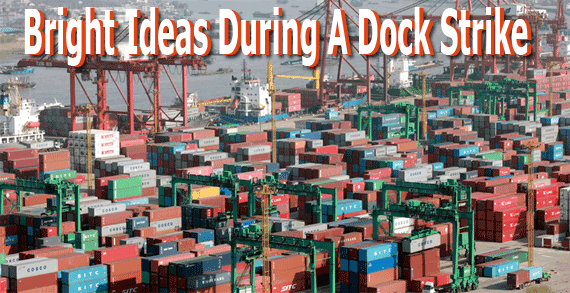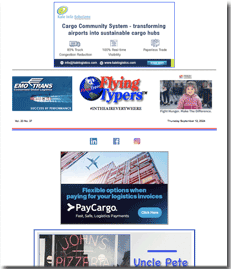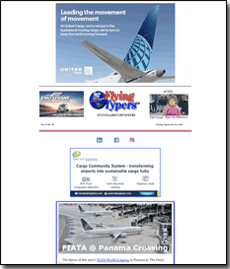 |
Automation
Makes People More Efficient
 Donna Mullins
Donna Mullins
Vice President
Kale Logistics Solutions
Dock strike does not leave the
best and the brightest in air cargo speechless.
Here are thoughts and strategies for
moving cargo during the U.S. dockworkers strike, which is halting
half the nation's ocean shipping.
Donna Mullins of Kale Logistics Solutions
is an industry veteran with close to four decades of experience
in the logistics and supply chain industry. She has held key positions
in airlines, freight forwarding and customs brokering firms.
Under her stewardship, companies expanded
their global footprint and capabilities.
Today Donna and the team at Kale Logistics
including CEO Amar More and others are changing the way air cargo
gets in and out of airports everywhere as fast as possible.
 While
I cannot applaud the current administration for their actions regarding
the strike, I certainly do applaud U.S. Customs & Border Protection. While
I cannot applaud the current administration for their actions regarding
the strike, I certainly do applaud U.S. Customs & Border Protection.
Customs started taking proactive measures
last week to allow for entry port changes prior to the start of
the strike.
This will help to move already delayed
cargo faster once it does arrive at an operational port.
Federal Maritime Commission has also stepped
up to ensure detention and demurrage charges are not exaggerated.
NVOs and BCOs should be reviewing the FMC
D&D suggestions.
According to press reports, in addition
to other grievances the International Longshoremen's Association
(ILA) is strongly against automation for fear of being replaced.
Please let me be clear here - automation
doesn't inherently replace people, it makes people more efficient.
Our Cargo Community System automation for
ports and airports helps to streamline cargo status information
among stakeholders . . . including the ILA workers . . . to increase
cargo and container throughput, reduce truck wait and dwell times,
and allows the trusted trade partners the ability to view real-time
tracking of the cargo movement.
For now, if you need your merchandise before
the waters calm, no pun intended, you should be considering an air
alternative.
There is no set time frame for the strike
and with us seeing a $5.6 billion dollar a day economic impact and
backlogs worse than the pandemic it might not be the right time
to 'wait and see'. |
American Is Ready To Help
 Roger
Samways Roger
Samways
Vice President, Commercial American Airlines Cargo
Somehow after nearly 28 years
in air cargo, the erstwhile Roger is out and about retaining a youthful
exuberance we can all admire.
But right now where the rubber meets
the road, here are some seasoned thoughts and strategies from Roger
for moving cargo during the U.S. dockworkers strike, which is halting
half the nation's ocean shipping.
 The situation is certainly fluid, and we are continuing to engage
with our forwarder partners to ensure that we are ready to meet the
changing needs of their customers.
The situation is certainly fluid, and we are continuing to engage
with our forwarder partners to ensure that we are ready to meet the
changing needs of their customers.
We
have seen a strong uptick in volumes across our network over the last
10 days, and especially moving to the U.S. out of Europe and Latin
America. We partially attribute this to customers looking to move
business ahead of any port strike.
Any
increase in demand stemming from the port strike is coming at a time
when demand across the industry is already high. American is not alone
amongst carriers reporting double digit growth in volumes YTD.
Speaking with our forwarder partners, although
some ocean freight shippers have looked to “de-peak” by
moving shipments early in the summer ahead of a traditional peak,
there are many who have not done this. Airfreight requests from these
shippers is beginning to grow and could grow rapidly if the strike
persists.
American is ready to help
– we have an extensive Transatlantic and Latin American network
which offers 814 widebody flights per week between the U.S. and Europe
and 154 widebody flights per week between Latin America and the U.S.
 |
Euro
Forwarders Knock Around The Clock
 Nicolette
van der Jagt Nicolette
van der Jagt
Director-General
CLECAT, (European Association for Forwarding,
Transport, Logistics and Customs Services).
Nicolette van der Jagt, who has served as the Director General
of CLECAT since
January 2012. Nicolette is knowledgeable, dependable and resourceful,
with impressive character and keen political instinct.
Here is her thoughtful take on matters
today concerning Europeans and the U.S. East Coast Dock Strike.
 For European freight forwarders and shippers, the unfolding U.S.
dockworker strikes on the east and Gulf coasts are intensifying
an already challenging situation. With the ongoing disruptions caused
by the Red Sea crisis, the industry is forced to deal with equipment
imbalances, higher costs, and operational bottlenecks.
For European freight forwarders and shippers, the unfolding U.S.
dockworker strikes on the east and Gulf coasts are intensifying
an already challenging situation. With the ongoing disruptions caused
by the Red Sea crisis, the industry is forced to deal with equipment
imbalances, higher costs, and operational bottlenecks.
One of the immediate impacts is the
shifting of containers to less optimal locations, which means freight
forwarders will need to manage the logistical complexity of repositioning
equipment. This disruption is already leading to surcharges and
re-routing expenses as shippers look for ways to mitigate delays.
Additionally, there is an expectation that freight rates will surge
due to heightened demand and capacity constraints, particularly
on key shipping lanes.
For European freight forwarders, the
knock-on effects are that they will need to consider alternative
strategies, such as increasing reliance on airfreight. With demand
for air cargo capacity spiking rates are expected to soar, particularly
for express and guaranteed cargo. This complex situation requires
European freight forwarders and shippers to proactively manage their
supply chains by tracking inbound shipments closely, collaborating
with shipping lines to find alternative routes, and considering
expedited solutions like airfreight. |
| Port
Strike View From Ram Menen
 Ram
Menen Ram
Menen
Emirated SkyCargo
Retired
Ram Menen is well known in the
industry as the man that started up and built the cargo division
of Emirates SkyCargo.
He is also a founding member of The
International Air Cargo Association TIACA as well as Past President,
CEO and Chairman of the Board.
 Although there is never a good time, this U.S. east coast port strike
has come at a very inopportune moment, when the market is already
at high point, even, before the normal peak periods.
Although there is never a good time, this U.S. east coast port strike
has come at a very inopportune moment, when the market is already
at high point, even, before the normal peak periods.
The alternatives would be to find
other ports which are not really affected and reroute the ships
to those places.
The chances are every solution you
look will create additional transportation/distribution costs as
well as expensive delays for cargo which is already in the waters.
Air cargo will benefit while shippers
try to get top up inventory as quickly as possible.
But capacity at the moment is tight
and finding capacity will be a bit of challenge.
Rerouting ships to external ports
where sea/air can be affected can also be a good strategy.
In the immediate cure, the closure
of factories in China for the golden week celebration, will free
up some air capacity for short haul sea/air mode, however, the window
of opportunity is already closing.
The demand for air cargo post the
golden week is going to be extremely tight and will be at a premium.
Every which way you look the supply
chains are going to take a hit.
The impact will affect every aspect
of normal life in the regions where the strikes are taking place
and elsewhere.
This where logisticians can and will
get very creative and find best possible solutions. |
|
| Alternatives
During U.S. Dock Strike
 John
Gemmell John
Gemmell
Principal
Gemco Aviation
Here John, a top to bottom air
cargo professional shares some thoughts on the growing U.S. East
Coast Dock Strike.
 Obviously
shifting to alternative ports not being struck, Including Canada
and Mexican ports offer some possibilities. Obviously
shifting to alternative ports not being struck, Including Canada
and Mexican ports offer some possibilities.
These ports will experience capacity constraints
and delays due to increased volumes.
Also utilizing different ports will drive
using more intermodal transportation , trucking, rail, barge, in
getting goods to regional inland markets and distribution centers.
Though considerably more expensive, air
charters are the obvious possibility for time-sensitive, high-value,
such as electronics, Pharma and perishables.
“Charter rates will soar in an already tight market competing
with e-commerce shippers, especially approaching late Christmas
market and inventory
demands! |
|




 Vol.
23 No. 37
Vol.
23 No. 37